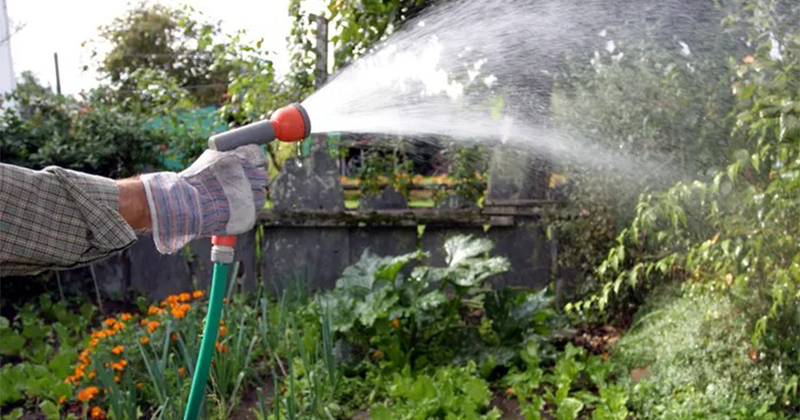
Why Watering Your Garden with Rainwater Is Beneficial.
Rainwater is a valuable resource that is often overlooked when it comes to watering our gardens. Many gardeners rely solely on municipal water or groundwater to keep their plants hydrated, but there are many benefits to using rainwater instead. In this article, we will explore the benefits of using rainwater to water your garden.

Rainwater is free
One of the most obvious benefits of using rainwater to water your garden is that it is free. Municipal water can be expensive, especially during the hot summer months when your garden needs the most water. By collecting rainwater, you can save money on your water bill and put that money towards other garden expenses.
Rainwater is better for your plants
Rainwater is naturally soft and slightly acidic, which makes it ideal for plants. Municipal water, on the other hand, can be hard and alkaline, which can be harmful to some plants. Rainwater is also free of chlorine and other chemicals that are often added to municipal water. By using rainwater, you can ensure that your plants are getting the best possible hydration.
Rainwater is better for the environment
When you use municipal water to water your garden, you are contributing to the depletion of a precious resource. Groundwater levels are already under stress in many areas, and using less water can help preserve this resource. Collecting rainwater also helps reduce runoff and erosion, which can be damaging to the environment.
Rainwater can improve soil quality
Rainwater is naturally free of minerals and salts that can build up in the soil over time. By using rainwater to water your garden, you can help flush out these minerals and salts, which can improve the quality of your soil. This can lead to healthier plants and better yields.
Rainwater harvesting is easy
Collecting rainwater is easier than you might think. All you need is a rain barrel or two, which can be purchased at most garden centers or hardware stores. Simply place the barrel under a downspout or gutter, and let the rain do the rest. You can even attach a hose to the barrel to make watering your garden even easier.
Rainwater is great for container gardens
If you have a container garden, rainwater is an excellent choice for watering your plants. Because container gardens require more frequent watering than traditional gardens, using municipal water can be expensive. By collecting rainwater, you can ensure that your container garden gets the hydration it needs without breaking the bank.

Rainwater can reduce the risk of plant diseases
Municipal water can sometimes contain pathogens and other contaminants that can increase the risk of plant diseases. Rainwater, on the other hand, is generally free of these contaminants, which can help reduce the risk of plant diseases. This can lead to healthier plants and a more productive garden.
Rainwater is better for wildlife
Municipal water often contains chlorine and other chemicals that can be harmful to wildlife. By using rainwater, you can help reduce the amount of chemicals in your garden, which can make it a safer and healthier place for wildlife to live. This can include everything from birds and bees to butterflies and other insects.
Rainwater is a renewable resource
Unlike groundwater, which can take years to replenish, rainwater is a renewable resource that is constantly being replenished. By collecting and using rainwater, you are helping to reduce your dependence on other, less sustainable sources of water.
Rainwater is a source of nutrient-rich water
Rainwater can be a source of nutrient-rich water that can help your plants grow. Rainwater can contain small amounts of nitrogen, which is an essential nutrient for plant growth. By using rainwater, you can help provide your plants with the nutrients they need to thrive.
Rainwater can help prevent erosion
When it rains, water can quickly run off the surface of the soil, causing erosion. By collecting rainwater and using it to water your garden, you can help slow down the flow of water and reduce erosion. This can be especially important if you have a sloped or hilly garden.
Rainwater can be used for other purposes
In addition to watering your garden, rainwater can be used for a variety of other purposes. For example, you can use it to wash your car or clean your outdoor furniture. You can also use it to fill a swimming pool or hot tub, or to water indoor plants.
Rainwater harvesting can be a fun DIY project
Collecting rainwater can be a fun DIY project that can be completed in an afternoon. You can purchase a rain barrel or build your own using a large plastic container. Once you have your rain barrel set up, you can enjoy the satisfaction of collecting and using your own rainwater.
Rainwater can help conserve energy
Collecting and using rainwater can help conserve energy in a number of ways. First, it can reduce the amount of energy needed to pump and treat municipal water. Second, it can reduce the amount of energy needed to transport water long distances. And third, it can reduce the amount of energy needed to heat water for outdoor use, such as watering plants or washing your car.
Rainwater can reduce your carbon footprint
By reducing your dependence on municipal water, you can help reduce your carbon footprint. This is because the treatment and transportation of water require energy, which can produce greenhouse gas emissions. By using rainwater instead, you can help reduce these emissions and contribute to a more sustainable future.
Lastly, using rainwater can be a great way to teach children about the importance of conserving water and caring for the environment. By involving children in the process of collecting and using rainwater, you can help them understand the value of this natural resource and the importance of using it wisely.
In conclusion, using rainwater to water your garden has many benefits, including being free, better for your plants and the environment, improving soil quality, and reducing the risk of plant diseases. In addition, rainwater harvesting can be a fun and rewarding DIY project that can help conserve energy and reduce your carbon footprint. So the next time it rains, consider collecting some of that valuable resource and using it to help your garden thrive.
